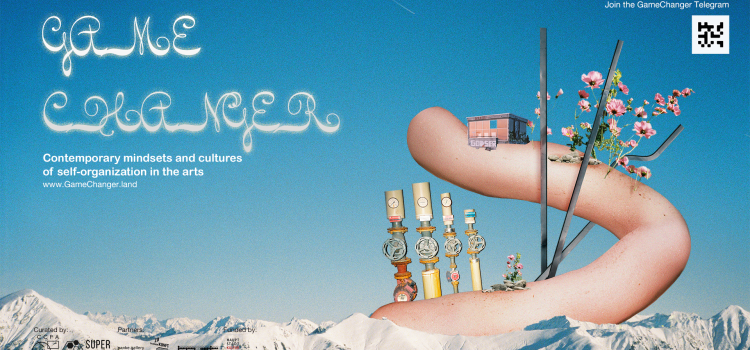This is the curatorial text of Cassie Thornton’s GameChanger residency at TRUST
Creating alternative social infrastructures is fundamental to Cassie Thornton’s artistic practice. With regards to her GameChanger residency she calls it “building conspiratorial networks of interdependence”. For GameChanger, she is testing a new peer support method that marries the proven Workers‘ Inquiry approach with The Hologram – a holistic mutual aid practice. A group of twenty participants explore their individual and collective experiences of power and money, as messy and relational as they are in the cultural field. The host of Cassie’s residency is TRUST, a coworking- and community space in Berlin, that describes itself as a “network for utopian conspirators”.
TRUST and its community network is the starting point for exploring and visualising “the lines of solidarity and the potential for collective action among disparate, perhaps conflicted parties”, as Cassie Thornton puts it in her invitation letter.
We, the curatorial team of GameChanger, are particularly interested in critically assessing the conspirational, once the underlying social relations are being exposed. How much of the work that is being done in collaborative, creative environments is aligned with values such as solidarity, mutual care and equal distribution and how much of it is just self-labeled and, in fact, business as usual?
Experimenting with alternative social infrastructures has been common practice within the art world, and, possibly due to the combined effects of several multiple crises on a global scale, has gained momentum recently. Artists are developing local currencies, systems of mutual care, food production, information security or governance systems. These systems are on the spectrum between the speculative, fictional and real world responses to these current crises and define artistic practices, which become closely connected to activism and political organising.
Like in the case of Cassie Thornton’s work, these artistic practices often have a conspiratorial character. Wikipedia informs us that the term conspiratory generally implies “wrongdoing or illegality on the part of the conspirators, as people would not need to conspire to engage in activities that were lawful and ethical, or to which no one would object.“ Within the art world it seems that it is the subversive glare that makes this affiliation seductive. Which brings us as curators to the question: How to develop structures of solidarity and conspiracy in the sphere of arts and culture, which is, above all, characterized by systemic competitiveness, privilege and inequalities?
In this third residency the GameChanger community is being asked to explore what sits underneath the “popular or decorative aspects of contemporary practices of self-organisation”. Cassie Thornton aims to explore and question those self-organised practices, enabling real social and productive benefits for practitioners through a new practice of collectivisation and mutual care, by cultivating peer support methods that have the potential to create impact on a bigger scale.
”What if building conspiratorial networks of interdependence is our first line of work, if we (whatever that means) are to survive the ongoing and incoming apocalypse?” asks Cassie Thornton in her invite to the cultural workers she selected to test the new peer support method. Looking at the twenty people who meet during the mutual aid practice sessions, the question is how much common ground there is between them? Are people ready to become co-conspirators? How does our training as capitalist subjects keep us seeing our relationships as a part of our economic survival or sources of competition?
In light of a world that’s falling into pieces, will people continue to believe that their individual work is more important than organizing around collective needs?
“There is no such thing as individual success in the apocalypse. What does individual success mean when your town is suddenly turned to rubble?” This is one of the central questions Cassie Thornton puts forward in her work.
Conspiracy is usually not directed towards the inner workings of a system, but rather describes a secret plan by a group that seeks to take a stance against an external force or threat. In arts and culture specifically, the threats typically addressed are rather economic ones, such as funding cuts or rising costs of living. However, what if these threats do not continue to mainly impact artists and cultural workers, but rather affect the whole of society?
What is then the specific conspiratorial potential for the artistic and cultural sector?
Becoming a co-conspirator requires each group member to share the same incurred risk by being involved in the collective action. Things tend to get messy if not everyone has equal “skin in the game”. What if measures of collective actions come at higher costs for some members of a group who have more to lose than others, for instance because of political prosecution, racial discrimination or poverty?
Cassie Thornton’s project is situated in a field of high complexity, which definitely is not fully explored yet. How much do we need to understand about governance, social contracts and human coordination when trying to assess conspiracy practices in a given environment? Do we have any “objective” measures in place that help us navigate popular claims of collective action and solidarity?
Having participated in one of her curated encounters with other peers, it becomes clear that the methodology she uses is highly effective in sensing into the social field that defines the community experience of a space. The sessions, which will be transcribed and processed via an AI technology, provide a shortcut to understanding social patterns and hidden themes that manifest into the language, rituals and vibes of community projects. Cassie Thornton’s work for GameChanger can be seen as a kind of litmus test that reveals information about intentions and authenticity of cultural projects that seek to create post-capitalist structures of collectivism, while at the same time still being stuck in the prevailing capitalist system.
Co-curators of GameChanger, a project co-produced by SUPERMARKT and the Curatorial Collective of Public Art.

